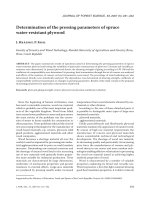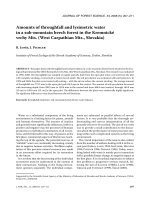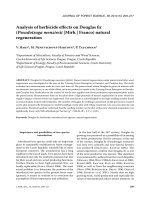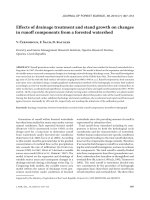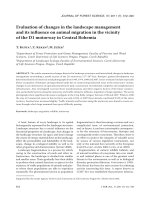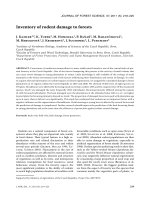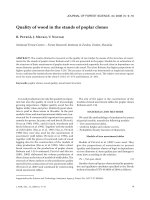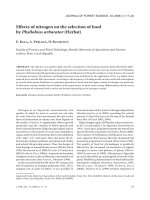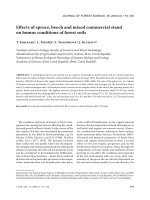Báo cáo lâm nghiệp: " Effects of long-term water stress on net photosynthesis, growth and water-use efficiency of conifers in the field" doc
Bạn đang xem bản rút gọn của tài liệu. Xem và tải ngay bản đầy đủ của tài liệu tại đây (173.36 KB, 5 trang )
Effects
of
long-term
water
stress
on
net
photosynthesis,
growth
and
water-use
efficiency
of
conifers
in
the
field
K.
Gross
Institute
of Silviculture,
University of Freiburg,
D-7800
Freiburg,
F.R.G.
Introduction
Water
stress
strongly
influences
growth
of
trees
and
might
also
be
involved
in
today’s
forest
decline.
There
are
considerable
dif-
ferences
in
susceptibility
to
environmental
constraints
in
populations
and
between
species.
In
the
present
study,
a
defined
water
stress
was
applied
to
young
trees
of
Norway
spruce
and
Douglas
fir
under
otherwise
natural
environmental
condi-
tions.
Both
species
were
analyzed
for
dif-
ferences
in
water-use
efficiency
and
bio-
mass
production.
Materials
and
Methods
Sixteen
10-15
yr
old
and
1.5-2.5
m
high
trees
(10
spruces
(Picea
abies)
and
6
Douglas
firs
(Pseudotsuga
menziesii)
were
transplanted
into
containers
and
divided
into
3
groups.
Four
spruces
originated
from
a
single
clone;
the
Douglas
firs
were
not
genetically
uniform.
One
group
was
provided
with
optimal
amounts
of
water
and
the
other
2
received
less
water.
The
predawn
water
potential
(
Vf
pd)
was
used
as
a
measure
of
water
supply.
This
potential
was
held
at
a
constant
level
in
each
group
for
a
pe-
riod
of
2
yr
by
controlling
the
water
supply
(Table I).
An
NPK-fertilizer
was
applied
to
all
trees
in
the
spring.
Gas
exchange
was
repeatedly
measured
in
3
fully
climatized
chambers
(Koch
systems)
throughout
the
vegetation
period
on
the
same
current
year’s
shoots
alternating
between
spruces
and
Douglas
firs.
The
results
were
based
on
needle
dry
weight
at
the
end
of
the
vegetation
period.
Water
relation
parameters
of
the
youngest
twigs
were
determined
by
means
of
the
pres-
sure-volume
technique
(Tyree
et
al.,
1978;
Gross
and
Pham-Nguyen,
1987a).
Growth
in
height
and
width
was
measured
at
regular,
2
wk
intervals.
After
2
yr
of
experimentation,
the
majority
of
the
trees
were
felled,
analyzed
and
dried.
Dry
matter
of
the
needles,
twigs,
branches,
trunk
and
large
(>
10
mm)
and
fine
(<
10
mm)
roots
were
determined,
with
reference
to
their
year
of
generation.
Increase
in
biomass
over
the
final
vegetative
period
and
water-use
efficiency
were
calculated
(Gross
and
Pham-Nguyen
1987b;
Gross
1988).
Results
Trees
receiving
optimal
water
supply
showed
the
highest
net
photosynthesis
PICEA
and
thus
also
’
the
fastest
growth.
Douglas
fir
was
superior
to
spruce.
Net
photo-
synthesis
in
trees
with
limited
or
very
limit-
ed
water
supply
was
reduced
(Figs.
1,
2).
The
degree
of
reduction
depended
pri-
marily
upon
intensity
of
water
stress
but
was
also
modified
by
water
vapor
satura-
tion
deficit
(WSD)
and
the
level
of
the
turgor
loss
point
(Figs.
1,
2).
In
contrast
to
experiments
under
steady
state
conditions
in
the
lab
with
fixed
values
of
air
humidity,
daily
integrals
of
WSD
seem
to
be
more
useful
under
field
conditions,
since
they
take
seasonal
changes
in
daylength
into
consideration.
Thus,
the
reduction
in
net
photosynthesis
was
always
greater
on
long
and
sunny
summer
days
with
high
daily
integrals
of
water
vapor
saturation
deficit.
On
moist
and
overcast
days
or
short
days
in
autumn,
however,
with
low
daily
integrals
of
WSD,
the
reduction
in
net
photosynthesis
was
less
pronounced
(Figs.
1, 2).
The
turgor
loss
point
(
Vtl
)
sank
from
about
-1.6
to
-2.6
MPa
in
spruce
and
from
-1.7
to
-3.0
MPa
in
Douglas
fir
be-
tween
the
end
of
June
and
November
(Fig.
1
Parallel
to
this,
relative
water
content
at
loss
of
turgor
(RWC
P)
was
re-
duced
from
85
to
74%.
Additional
exper-
iments
have
shown
that
net
photosynthe-
sis
was
reduced
to
zero
when
the
predawn
water
potential
reached
the
tur-
gor
loss
point,
reflecting
complete
stoma-
tal
closure.
Consequently,
the
reduction
of
net
photosynthesis
in
trees
with
limited
and
very
limited
water
supply
was
more
pronounced
in
summer
than
in
autumn
(Fig.1).
).
Water-use
efficiency
was
greater
for
both
species
under
conditions
of
limited
water
supply,
indicating
different
kinetics
for
C0
2
and
water
vapor
diffusion
or
sto-
matal
conductance
(cf.
Larcher,
1960).
Under
conditions
of
good
water
supply,
Douglas
firs
were
more
efficient
than
spruce
trees
(Figs.
3
and
4).
Long-term
water
stress
had
no
effect
on
supply
of
essential
nutrients
to
the
trees.
!nn- -
No
symptoms
typical
of
forest
decline
were
observed.
Conclusions
Both
species
differed
in
2
essentials
fea-
tures
reflecting
adaptations
to
their
natural
habitat:
1)
under
conditions
of
good
water
supply,
Douglas
fir
had
a
higher
water-use
efficiency
than
Norway
spruce;
2)
turgor
loss
point
values
for
mature
Douglas
fir
twigs
were
lower
than
those
of
spruce,
thus
indicating
a
better
water
stress
toler-
ance.
Both
features
probably
are
reasons
for
the
high
productivity
of
Douglas
fir
in
central
Europe.
Acknowledgments
This
work
was
supported
by
Deutsche
For-
schungsgemeinsc:haft.
References
Gross
K.
(1988)
Net
photosynthesis,
biomass
production
and
water-use
efficiency
of
young
Norway
spruces
and
Douglas
firs,
given
dif-
ferent
levels
of
water
supply
for
several
years
in
the
field
(in
German).
Allg.
Forst Jagdztg.
159,
230-239
Gross
K.
&
Pham-Nguyen
T.
(1987a)
Pressure-
volume
analyses
on
shoots
of
Picea
abies
and
leaves
of
Coflea
liberica
at
various
tem-
peratures.
Physiol.
Plant.70, 189-195
Gross
K.
&
Pham-Nguyen
T.
(1987b)
The
influence
of
constant
long-term
water
stress
on
net
photosynthesis
and
growth
of
young
spruces
(Picea
abies
[L.]
Karst)
and
Douglas
firs
(Pseudotsuga
menziesii
[Mirb.]
Franco)
in
the
field
(in
German).
Forstwiss.
Centralbl.
106,
7-26
Larcher
W.
(1960)
Transpiration
and
photosyn-
thesis
of
detached
leaves
and
shoots
of
Quer
cus
pubescens
and
Q.
ilex
during
desiccation
under
standard
conditions.
Bull.
Res.
Counc.
Isr.
Sect D 8. 213-224
Tyree
M.T.,
Cheung
YN.S.,
MacGregor
M.E.
&
Talbot
A.J.B.
(1978)
The
characteristics
of
sea-
sonal
and
ontogenetic
changes
in
the
tissue-water
relations
of
Acer,
Populus,
Tsuga,
and
Picea.
Can.
J.
Bot
56,
635-647
